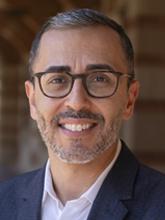- Date: Thursday, July 10, 2025
- Time: 1:00pm EDT to 2:00pm EDT
On This Page
- All Heading 2s will automatically be pulled in to this list.
- Do not edit the content on this template.

Speaker
Mina Sedrak, M.D., M.S.
Associate Professor of Medicine
Director of Cancer and Aging Program
David Geffen School of Medicine
UCLA
Biography
Dr. Mina Sedrak is an Associate Professor of Medicine and Director of the Cancer and Aging Program at UCLA. His research investigates the mechanisms behind cancer treatment-induced accelerated aging and aims to develop innovative therapies to prevent or reverse this process. Dr. Sedrak’s work, recognized by the NIA with the Paul B. Beeson Career Development Award, bridges cancer and aging to improve outcomes for older adults with cancer. Passionate about inclusivity, he advocates for greater representation of older, frail adults in clinical trials. In addition to his research, he holds key leadership positions, including Vice Chair of the Alliance NCORP Cancer in Older Adults Committee and Chair-Elect of the Research Committee for the American Society of Clinical Oncology.
Abstract
The relationship between aging and cancer is complex and bidirectional. Aging-related processes—such as cellular senescence, genomic instability, and chronic inflammation—not only drive cancer development but also contribute to treatment-related accelerated aging. Understanding the dynamic interplay between aging and cancer may create new opportunities to improve cancer prevention and develop treatments that help protect long-term health. This presentation will explore how cancer and aging interact, highlight new therapies targeting aging biology, and discuss ongoing clinical trials testing these approaches in oncology. Lastly, we will outline future research directions to integrate geroscience into cancer care and improve patient health outcomes.
